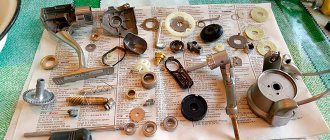This Russian-Japanese phrasebook with pronunciation and transcription includes common words and expressions for everyday communication: standard phrases of greetings, thanks, questions, requests, a set of words for communication in shops, restaurants, hotels, orientation in a new and unfamiliar place and much more.
Typically, English is used for communication in the tourism industry. At the same time, knowing and using common polite phrases that the Japanese phrasebook offers will help establish contact and earn the respect of the local population.
In the Russian-Japanese phrasebook for tourists, pronunciation is given based on transcription. The colon indicates the longitude of the sound. For convenience, you can download the Russian-Japanese phrasebook for free in pdf format.
Greetings
| Good morning | O-hayo: gozaimas |
| Good afternoon | Konnichiwa |
| Good evening | Konbanwa |
| Hello how are you doing? | Konnichiwa, do: des-ka? |
| How are you doing? | Go-kigen ikaga des-ka? |
| How are you? | De anata-wa ikaga des-ka? |
| OK, thank you | Arigato, genki des |
| How are you? | Before: des-ka? |
| Still | Aikawarazu des |
| So-so | Ma: ma des |
| Hello! | I:! |
| Welcome! | Yo: askew! |
| Glad to see you | O-aisite ureshii |
| See you! | Jya: mata |
| Goodbye | Sayo: nara |
| Good night | O yasmi nasai |
| Till tomorrow | Mata Ashita |
| Best wishes | Dewa o-daiji-ni |
| take care of yourself | Deva o-karada-o taisetsu-ni |
| I have to go | Oitoma simas |
Standard phrases
| Thank you very much | Do: mo arigato: gozaimas |
| Thank you | Taihen arigato: gozaimas |
| My pleasure | Before: itashimashite |
| Do not mention it | O-rei niwa oyobimasen |
| Nothing, don't worry | Nandemo arimasen |
| Thanks for the service | Go-kuro: deshita sama |
| thanks for the invitation | Go-sho: tai arigato: gozaimas |
| Sorry (excuse me), please | Shitsurei (sumimasen) |
| What is your name? | Nan toyu: o-namae des-ka? |
| Tell me please | Chotto sumimasen ga |
| Please pass | O-hairi kudasai |
| Here please | Do: zo kotirae do: zo |
| Let me introduce myself, I | Jikosho: kai sasete itadakimas, watashi-wa |
| Meet me please | Do: zō o-chikazuki-ni natte kudasai |
| Glad to meet you | Hajimemashite |
| Very nice | O-mi-ni kakarete ureshii des |
| What is your first and last name? | O-namae to myo: ji-wa nan-to iimas-ka? |
| My last name is my name | Watakushi-wa sei-wa, namae-wa Mo: simas |
| Excuse me, please | Gomen nasai |
| Excuse me, please | Shitsurei des ga |
| I'm sorry | O-wabi itashimas |
| Thank you for your hospitality | Go-shinsetsu arigato |
| Thank you | Arigato (gozaimas) |
| Please! | Before: dzo |
| Do not mention it | Doitasimaste |
| Congratulations! | Omedit! |
| Thank you for everything! | Iroiro to do: mo arigato |
| Can `t you help me? | Onegai itashimas |
| Sorry to bother you | Was sumimasen desyta |
| Congratulations | Omadeto: gozaimas |
| I want to invite you to Russia | Rosia ni go-sho: tai sitai to omoimas |
| I want to invite you to a restaurant | Resutoran ni go-sho: tai sitai to omoimas |
| Come with us to... | ...ni isshoni ikimasen-ka? |
| Thank you for your help (for your cooperation) | Go-kyo: ryoku arigato: gozaimas |
| thanks for the gift | Presento arigato: gozaimas |
| I am very obliged to you | O-seva ni narimashita |
| Unfortunately I can not | Zannen nagara dekimasen |
| What is this? | Kore wa nan des-ka? |
| Why? | Naze des-ka? |
| Where? | Doko des-ka? |
| Who is this? | Kono hito wa donata des-ka? |
| My name is | Watakushi-wa-to iimas |
| I want to drink | Nodo ga kawakimashita |
| I want to sleep | Nemui des |
| I'm hungry (I'm hungry) | O-naka ga suitimas |
| Please help me | O-tetsudai o-site kudasaru yo: o-negai shimas |
| Can | Dekimas |
| I can not | Dekimasen |
| I can go with you | Anata to isshōni iku koto ga dekimas |
| I can't go with you | Anata to isshōni iku koto ga dekimasen |
| I'm very sorry, but I can't | Zannen des ga dekimasen |
| I'm busy (I don't have time) | Watashi wa isogasi |
| I need to hurry | Isoganakereba narimasen |
| I am late | Okuremas |
| I'm lost | Miti ni majotta |
| sorry for making you wait | O-matase shimashita |
| I don't understand | Wakarimasen |
| I understand | Vacarimas |
| Please come again | Do: zo mo: ichido ashita o-ide-ni natte kudasai |
| make yourself at home | O-raku-ni do: dzo |
| Sorry | Sumimasen |
| It's OK | Give jobu des |
| I | Watashi |
| You(you) | Anata |
| He | Kare |
| She | Kanojo |
| Woman | Josei |
| Man | Dunsay |
| Husband | Shujin |
| Child | Kodomo |
| Son | Musuko |
| Daughter | Musume |
| Big | Ookiy |
| Small | Chisai |
| Hot | Atsui |
| Cold | Samui |
| Hot | Atatakai |
| Cold | Tsumetai |
| Good | Ii |
| Bad | Warui |
| What? | Nan deska? |
| When? | Itsu deska? |
| For what? | Naze? |
| Who? | Dare deska? |
| You will not say | Chotto o-ukagai shitai no des ga |
| May I ask you? | Chotto o-tazune shite mo ii des-ka? |
| Listen | Moshimosi |
| Let's take a photo together | Isshoni shashin-o torimasho |
| I have to ask you | O-negai ga arimas |
| Help me please | Tetsudatte kudasai, tasukete kudasai |
| Call a translator | Tsu: yaku-o yonde kudasai |
| Do you understand Russian (English)? | Rosyago (igirisugo)-ga arimas-ka? |
| I do not understand well | Amari wakarimasen |
| Do you speak Russian? | Rosiago-o hanashimas-ka? |
| Yes, I talk a little/no, I don’t talk | Uh, sukoshi hanashimas/ie, hanashimasen |
| I do not understand you | Anata no itte iru koto ga wakarimasen |
| Please talk slowly | Mo: sukoshi yukkuri itte kudasai |
| Sorry, please repeat again | Shitsurei des ga, mo: ichi-do itte kudasai |
| I don't understand when people talk fast | Hayaku hanasareru to, watashi-wa wakarimasen |
| How would it be in Russian (English?) | Kore-wa roshiago (igirisugo)-de nan-to iimas-ka? |
| Wait a minute | Chotto matte kudasai |
| This is right | Sore-wa mattaku des |
| It is not right | Sore-wa tigaimas |
| Absolutely right | Ossyaru then: ri des |
| I was wrong (I was wrong) | Watashi-wa matigaimasita |
| Really? | Masaka n. e.? |
Many ways to say “thank you” in Japanese
This publication was started on November 24th, US Thanksgiving Day (the Canadian one has long passed) and the collection turned out to be quite thematic, because it contains many ways to say “thank you” in Japanese
So, let's go?
thanks for all
Variations depending on styles
colloquial )、いろいろいろありがとうな (simple colloquial) neutral)
Thank you very much
本当にありがとう(ほんとうにありがとう – general colloquial)、本当にありがとうございます( more neutral and formal compared to the previous version)
A simple conversational “thank you”
ありがとう, can also be heard among young people サンキュー from English. (thank you)
Thank you so much. I'm really, really, really grateful to you.
本当に、本当にどうもありがとう ございます
Well, thank you to excuse yourself:とにかくありがとう(ございます) - whatever it was, thank you (you)
Of course, the list would be incomplete withoutどうもありがとうございます– thank you very much. You can also “play around” with different parts of this stable expression of gratitude: you can say simply どうも、 or you can say a slightly more complicated どうもありがとう.
It is also worth mentioning the expression それはどうも - thank you for that. Or Thank you for this (with an emphasis on what gratitude is actually being expressed for).
Next is a slight complication of the designs. Gratitude for something (including an abstract-formal object) is used using the construction をありがとう
メールをありがとう(ございます) - thanks for the email
the answer (thank you for answering)
the wonderful gift . For more formality, it’s not a sin to add ございます
Let's move on, more complex and at the same time easy constructions (after all, they are passed at the JLPT N4 levels) and gratitude is expressed for a certain action:てありがとございますAlso don't forget :
おうえんしていただいてありがとうございます) - thank you for your support
Thanks for your advice
Thank you very much for telling us/ explained
Also even more formal thank you options:
be , grateful . The forms いただき / くださり do not work in Minna no Nihngo, but they can often be found in books on the business version of the Japanese language. Yes, we also took and constantly used this particular form in business Japanese courses.
You can “heavier” the above-mentioned constructions even more, and make them the most grateful to the depths of your soul and even deeper, using the word 誠(まこと) - to be sincere (in this case, with gratitude to someone)
Let's take a couple of the above examples.
( えいぶんおしえてくださり、まことにありがとうございます) - Thank you for interpreting this sentence in English
or, since the above examples were promised, it would be better to take アドバイスをしてくれて、まことにありがとうございます– very sincere thank you for the advice you gave
Well, now you can, so to speak, exhale a little - you can be grateful for something using the construction感謝しています(かんしゃしています)- “I am so grateful to you for the fact that...”, or more polite options: 感謝しております, as well as 心より感謝いたします, once I even had to see 感謝いたしております. And a few examples of cliché phrases below:
- I am grateful to you to the bottom of my heart
I am grateful to you from the bottom of my heart
I am so deeply grateful
Thank you, and I am forever obliged to you, you can convey it in the form恩に着る(よ) – おんにきる(よ)
もしそうしてくれたならいつまでも恩に着る- if you do this for me, I will be immensely grateful to you (I am obliged to die)
Working moments in gratitude
It is also worth making a branch from here into related gratitude: for work, for service or work rendered, and so on.
Firstly, for the fact that they did something to you and literally “saved” you, you say this:
助かりました (たすかりました)、 or less formal 助かった(たすかった) - oh, well, you really saved me = thank you
Continuing the theme of work, at work you can hear an expression familiar from Minna’s textbooks:ごくろうさま(です) , which will be written in kanji as ご苦労様です. Literally, “thank you for your work” = “I really appreciate the effort you put into your work.” It happens that the boss will casually throw out just ごくろう, but in anime and everyday speech-slang (for example, in the same tweets) he can slipご苦労さん(ごくろうさん)、or even ご苦労チャン (ごくろうちゃん) , and the other day we even metご苦労君 (ごくろうくん) . All these expressions are “thank you” for the work. However, it is worth remembering that only theごくろうさま(です) , i.e. you should remember to whom and in what setting gratitude is given for the work.
And also, at the same rate, it’s worth recalling that ご苦労様です is said by superiors or colleagues of higher status. And only friends can throw a malicious 「はい、はい、ご苦労チャン」 - Okay, okay, you are MALADES, thanks (informal language is used specifically in the Russian version)
Much more common thank you and “goodbye” among work colleagues
Thank you, you did a good job and further on the context (
おさきにしつれいします). In general, according to this site, the expression お疲れ様 is used regardless of position and status “above-below”. But, it’s better to say お疲れ様です to newcomers at work.
It seems that the work chapter on how they say thank you (and in fact this is a harbinger of “goodbye” at work) has come to its logical conclusion. Although it is worth noting thatお疲れさん、and お疲れちゃん can also be found in slang, they are also used to playing with nominal politeness suffixes, as we saw above in the example with ごくろうくんom.
Now there is a rather interesting topic, which is covered at least in manga comics published by educational literature publishers, that, say, words of apology (usually the word すみません)、 can express gratitude, i.e. thank you. This is worth dwelling on in more detail .
So, the wordすみません( and with it the more colloquialわるい、すまないand the very colloquial male dialectわりぃ, which is often combined with the corresponding particle な) can mean, oddly enough, “thank you.” Of course, here, as in many of the examples above, context is very important. Of course, we are also accustomed to the fact that すみません means “sorry,” but there are situations in which this same “sorry” is equated to “thank you.” So, the context of such expressions is that by your request (or something else) you caused your interlocutor trouble and discomfort (for example, you asked him to call early and wake him up, you borrowed an umbrella from him or her, you asked him to drop everything and, say, bring it from the warehouse box, asked to help with lunch, etc., where you burden your friend with your cravings. The person agreed and you can say すみません、 well, the guy can generally sayわりぃ- fans of manga and anime are aware of this tradition).
Be that as it may, formal or not, the form means “thank you.”
You can also, in some cases, hear different “transformer phrases” from the words of gratitude that have already been discussed in this publication: for example, you can hearどうもすみません、ありがとうございます. Just like that!
Since we were talking about すみません as a “thank you”, it is also worth including in this list恐れ入ります (おそれいります) - “thank you”. However, this expression is not for everyday speech. You will see it in reference books on Japanese business vocabulary language. You can often see this on sites where technical support or custom service communicates with their clients (business representatives can use this expression in relation to clients). It is believed that恐れ入ります is a mega-polite form of すみません. However, reference books indicate the meaning of 恐れ入ります only as a “thank you,” while すみません is also “sorry.”
This concludes the paragraph on apologizing as a “thank you” as well. However, the gratitude does not end there. Since we started talking about business above, it’s worth mentioning small businesses and shops where you can hear:
, come visit us again (he sends off words of gratitude to his client, who I just bought something in a shop).
In fact,まいどis a short form of毎度あり, and this form in turn is a short form of毎度ありがとうございます. The meaning of all phrases is the same: gratitude to customers who constantly come to your shop or cafe. It is also easy to remember this expression by the fact that毎度、まいど – “every time”, in other words, gratitude for every new visit that you pay to the owners of the business (also, in some contexts the author of this message saw the translation “it’s always a pleasure to do business with you” , although in essence this is not a business partnership, but work with the clientele, on which the business owner, oh, how much he depends).
Well, since we were talking aboutまいど、, it’s worth remembering the Kansai expression of gratitude まいどおおきに - thank you very much (this is in relation to clients). Or simply おおきに – thank you in the Kansai region in general. By the way, おおきに is in turn an abbreviation forおおきにありがとう, so that in Kansai they also say ありがとう;).
Modern and ancient “thank you”
And, since we are already talking about dialects, it is worth remembering “samurai-go” (武士語(もののふ語)) – archaic Japanese, which is inherent, according to evidence of samurai speech. Also, a characteristic set of phrases is used by otaku who study the culture of “bushi ", and fans of manga, anime, or dramas about samurai (or all together). Moreover, they are fans to such an extent that they use this set of phrases and grammatical expressions in everyday speech. So, instead of words of gratitude, if we are talking about 武士語, you can hear忝い、辱い- which are pronounced likeかたじけないand mean “huge gratitude”, “thank you”.
Well, since we remembered the archaic form of gratitude, it’s worth remembering slang. What can you say thank you for on the Internet?
フォロバあり/ ふぉろばあり– thank you for following (in particular, this applies primarily to Twitter)
ファボあり/ ふぁぼあり– thank you for liking my tweet (added my post to favorites)
リツイあり– thanks for the retweet
おはリプあり– say “good morning” in response to the morning greeting and at the same time thank you for something
おはあり– good morning and thank you!
おやあり– good night and thank you
おつあり– another slang for お疲れ様+ありがとう – you did a good job, thanks, well done
ほかてらあり– Thank you for telling me to “enjoy your bath”
So the Japanese youth are having fun, that is, thanking them
As you can see, in Internet slang ありがとう、 is shortened to あり、, as has already been done in まいどあり.
Well, now it’s time to start a new chapter of this message. Thank someone for the result achieved or hopes realized. This is expressed in the grammatical form found in textbooks for levels N3-N2 -のおかげ(で、だ、です)。More details - in the cheat sheet on this site or in textbooks. Just one example will be given here:
あなたのおかげで私が儲かる- Thank you - I have a benefit (only thanks to you I have income).
However, although infrequently, おかげ can be pronounced in a negative, malicious sense, so be careful:
Well, thank you, I'm late now. (this can be heard, again, in anime or simple speech, of course, examples in textbooks hardly illustrate this with examples).
Praise and how to thank for it
Well, and finally, an important “thank you” in response to a compliment: if you were praised, then you say ...そんな(yes, what are you, what are you, what are you... I am... I... just). But essentially this also applies to “thank you” for your compliment. Well, and a few more polite and formal options:ます – thank you for the praise . But another cliche phrase will be even more modest:お褒めいただき恐縮です (おほめいただききょうしゅくです) - I am embarrassed and touched by your praise. And also the quite often used phraseも worth yours at all praise (you are too wasteful in complimenting me). Well, and another cliché option : “Thank you” in response to praise and compliments.
If you notice that some fairly common and very important “thank you” was missed, please inform the author of the community (preferably VK). Thanks in advance everyone.
By the way, some of these phrases will be useful to those who are preparing to listen in Japanese. Of course, the compilers of exam tests do not take into account slang and samuraigo. But other cliche phrases may “light up” in the listening section of short answers (3 answer options)
If you find an error, please select a piece of text and press Ctrl+Enter.
Share on social media networks
RќСЂР°РІРёС‚СЃСЏ
Railway station
| Where can I find out the train schedule? | Ressha no jikokuhyo: -wa doko desho: ka? |
| Excuse me, where is the information desk? | Sumimasen ga, annaisho-wa doko des-ka? |
| Is there a train connection to the city from here? | Koko-kara -made tetsudo: -ga tsujite imas-ka? |
| How many hours (days) does the train take to the city? | Si-made kisha-de nan-jikan-gurai (nan-niti-gurai) des-ka? |
| From which platform does the train depart? | -yuki-wa namban-ho:-mu des-ka? |
| Does this train (this electric train) stop at? | Kono ressha (densha)-wa-ni teishya-shimas-ka? |
| Does this train go to the city? | Kono kisha-wa Si-e ikimas-ka? |
| This train doesn't go any further | Kono ressha-wa Eki-yori saki-e-wa ikimasen |
| There is no direct connection there. You will have to change planes. | Asoko-e-wa chokutsu:-wa arimasen kara, norikaenakereba Narimasen |
| What time is the next train until? | Yuki no tsugi no ressha-wa nan-ji des-ka |
| Excuse me, how do I get to the train station? | Totto o-tazune-shimas ga, eki-e-wa (teishaba-e-wa) do: ittara ii desho: ka? |
| Tell me, where is the ticket office? | Kippu-uriba-wa doko des-ka? |
| Where can I buy a ticket to the city? | Shi-made-no kisha-no kippu-wa doko-de kattara ii, but desho: ka? |
| How much does the ticket cost? | Kippu-wa ikura des-ka? |
| Can I return the ticket and get my money back? | Kippu no haraimodoshi-o site itadakemas-ka? |
| Please give me the lowest seat | Sita no shindai-o kudasaru yo: ni o-negai shimas |
| What carriage is this? | Kore-wa nan-go: xia deska? |
| This place is free? | Kono seki-wa aite imas-ka? |
| No, it's busy | Iie, fusagatte imas |
| Sorry, this is my place | Shitsurei des ga, soko-wa watakushi no seki des |
| Excuse me, what station is this? | Sumimasen ga, koko-wa nani eki des-ka? |
| Will this train arrive on time? | Kono kisha-wa jikan to ori-ni tsukima-mu-ka? |
| How many minutes is this train late? | Kono kisha-wa nampun okura des-ka? |
| Where can I buy a plane ticket to? | Yuki no hiko: ki no kippu-wa doko-de kattara ii, but desho: ka? |
| How much does a plane ticket cost to? | Yuki no hiko: ki no kippu-wa o-ikura des-ka? |
| How many hours is the flight to? | -made nanjikan kakarimas-ka? |
| Where is ticket registration done? | Kippu no chiekku-wa doko-de yatte imas-ka? |
| How much hand luggage can I take with me? | Tenimotsu-wa donogurai keiko:-dekimas-ka? |
| How many kilograms of luggage are you allowed to carry for free? | Ju: ryo:-seigen-wa nan-kiro-made des-ka? |
| Luggage weight exceeds the norm | Nimotsu-no ju: ryo:-ga seigen-o: ba:-site imas |
| Will the plane take off exactly on schedule? | Hiko: ki-wa yotei-do: ri shuppatsu shima-ka? |
| Flight delayed due to bad weather | Akutenko: -no tame shuppatsu-ga okurete imas |
| The plane has just been boarded | Tadaima to: jo-kaishi-no ana-unsu-ga arimashita |
| Airport terminal/airfield | Ku: ko:-ta: minaru/hiko: jo: |
| Railway station | Eki |
| Waiting hall | Matiaishitsu |
| Port | Minato |
| Marina | Futo: |
How and who to greet in karate?
Since one of the principles of karate is respect for the world around us, training begins and ends with a bow. One of the bows is used as a greeting:
- Low (performed from a sitting position);
- High (performed standing from the Musubi-dachi position).
The first bow is considered the most respectful greeting. It is performed at the beginning of the lesson, when it is necessary to greet the teacher (sensei), opponents and the place where the training will take place. They also close the session with a low bow to thank those present for the joint training that helped strengthen strength and spirit.
A high bow is used when a fighter addresses a teacher, greets an opponent before sparring, enters or leaves the gym before training. It should be remembered that the starting position for bowing is the Musubi-dachi stance: the heels are brought together, the toes are spread apart at an angle of 45°, the body is straight.
There are several types of greeting bows, but the greeting procedure itself takes place according to established rules . When entering the training room, you should bow to the center of the hall. Then say the greeting “Shinzen-ni-rei”, thus paying tribute to the founders of the karate school. After this, it is the turn to bow to the teacher and comrades.
To do this, students must stand in one row: the first are the athletes who have already received a black belt, followed by the holders of a brown belt, then blue, red, and then in descending order. As soon as each karateka has taken his place, the greeting can begin. In some schools, it is customary to say hello by saying “Osu, keiko o-negaishimas,” which means “Please teach me a lesson.” Such a greeting would be appropriate to use in relation to coaches, athletes of a higher rank, or holders of black belts.
Varieties of greetings in karate
A beginning karateka needs not only to be able to bow, but also to understand at what stage of training and for what purpose this or that bow is used. Traditionally, there are eight main types of greetings in karate. Each of them has its own purpose:
- shomen-ni-rei - bow forward, performed towards the front side of the dojo (the hall where karate classes are held);
- shinzen -ni rei - a bow expressing respect to the ancestors and creators of karate;
- sensei-ni-rei - a greeting bow to the teacher (sensei);
- shihan-ni-ray - bow intended for masters - holders of 5-7 dans;
- senpai-ni-rei - bow addressed to senior students;
- otagai-ni-ray - a greeting bow to the opponent;
- dza-ray – bow while sitting;
- ritsu-rei - standing bow.
When bowing, a fighter does not just greet the teacher and opponents. According to karate etiquette, "rei" is a formal ceremony, one of the purposes of which is to establish a trusting relationship between the participants in the fight. Proper greetings before kumite are extremely important, because if competitors trust each other and remember mutual respect, the likelihood of one of them causing injury or jeopardizing the other's life is minimized.
Passport control
| Fill out the entry (exit) form | Nu: koku (shukkoku) ka: do-o kinyu: si-te kudasai |
| Show your passport | Pasupo: to-o haiken shimas |
| Please, here is my passport | Do: zō, watashi no pasupo: to des |
| I'm a tourist | Watakushi-wa kanko: des |
| I came on business | Shoyo: de kimashita |
| Customs inspection of baggage | Zeikan tenimotsu kensa |
| Please provide your customs declaration | Zeikan shinkokusho-o misete kudasai |
| I have nothing to write down in the declaration | Zeikan-ni Shinkoku Surumono-wa Arimasen |
| This is my baggage | Kore-ga watakushi no nimotsu des |
| Do you have any prohibited items? | Kinseihin-wa arimasen n. e.? |
| This suitcase and this bag are mine | Watashi-no-wa kono toranku to baggu des |
| Please open (close) your suitcase | Kono toranku-o akete (shimate) kudasai |
| These are my personal things | Sore-wa watashi-ga jibun-de tsukau mono des |
| What is your currency? | Do: yu: gaika-o-mochi des-ka? |
| Here is my claim tag | Kore-ga tenimotsu uketori bango: des |
Orientation in the city
| Where is the hotel? | Hoteru wa doko ni arimas-ka? |
| Where is the bank located? | Ginko: wa doko ni arimas-ka? |
| How to get to the hotel? | Hoteru made wa do: ittara ii des-ka? |
| Where can I buy a phone card? | Terekhon-ka: do-o doko de utteimas-ka? |
| Where is the post office? | Yu: Binkyoku wa doko des-ka? |
| What time do we meet? | Nan-ji ni matiawasesima-ka? |
| Where shall we meet? | Doko de matiavasesimas-ka? |
| Is this a street? | Kore-wa To: ri des-ka? |
| House number Here? | Kono hen wa Banti des-ka? |
| What kind of building is this? | Kore-wa do: yu: tatemono des-ka? |
| Where I am? | Koko-wa doko des-ka? |
| I'm lost | Watashi-wa michi-ni mayota, but des ga |
| Tell me how to get to the hotel? | Chotto sumimasen ga, hoteru-e wa do: ittara ii desho: ka? |
| I need to go back to the hotel | Watashi-wa hoteru -ni kaeritai, but des ga |
| This is the next street | Sore-wa konotsugi-no to: ri des |
| How to get to the street? | To: ri-e wa do: ittara ii desho: ka? |
| Walk straight down this street | Kono to: ri-o massugu itte kudasai |
| At the intersection (at the traffic light/on the corner) turn (right/left) | Kohaten (shingo:/kado)-o (migi-e/hidari-e) magatte kudasai |
| It is far from here? | Koko kara to: and des-ka? |
| Yes, far away | Uh, then: and des |
| No, not far | Iie, then: ku arimasen |
| Can you walk there? | Aruite ikemas-ka? |
| This road? | Sono michi des n. e.? |
| You're going to the wrong place | Miti-ga tigatte imas |
| I would like to get to the station, but I don’t know the way | Eki-ni iki-tai, no des ga, michi-ga wakarimasen |
| Could you draw a plan for me? | Chotto, chizu-o kaite kudasa-imasen-ka? |
| Will you walk me to the metro station? | Chikatetsu no eki made tsure-te itte kudasaimasen-ka? |
| Is it possible to get there by metro? | Soko-e chikatetsu-de ikemas-ka? |
| Yes, you can | Uh, ikemas |
| What transport can you use to get there? | -e va donna norimono de ikemas-ka? |
| Where is the post office nearby? | Yu: Binkyoku-wa doko des-ka? |
| Where can I call from? | Denwa-o sitai, but des ga, doko-kara kakerare-mas-ka? |
Pronunciation guide[edit]
Currently, Japanese is a non-tonal language. It is recommended to speak without any accent at all. There are some intonation features in language that can affect understanding.
Japanese writing is quite complex; mastering it within the framework of a phrasebook is problematic. Most roots have characters of Chinese origin, which can be read in Japanese or Chinese, depending on the situation. Words of non-Japanese origin are written using the katakana syllabary. The few native Japanese words for which there are no characters are expressed using the hiragana syllabary. Hiragana is used to convey suffixes and endings that are assigned to roots (written in hieroglyphs, hiragana or katakana). Each katakana character uniquely corresponds to a hiragana sign, so it would be completely possible to use only hiragana or only katakana without hieroglyphs (which the Japanese successfully do in telegrams, SMS, etc., as well as when teaching children to read and write), but according to tradition all three systems are used simultaneously.
Vowels[edit]
Examples: [hitotsu] = [htots], [futatsu] = [ftats], [desu] = [des], [chikatetsu] = [tkatets]
The Japanese language distinguishes between long and short vowels (for the Russian language this difference is not significant, so you need to train to distinguish and reproduce long/short vowels).
Consonants [edit]
In Japanese, just like in Russian, there is a distinction between hard and soft consonants.
[p, t, k] before vowels of the first row are aspirated, i.e. pronounced with aspiration, especially in emotional speech;
Sound [n] [edit]
The sound [n] in Japanese, in addition to forming syllables like other vowels, also exists in the form of an independent syllable. This sound is called “moraic [n]” or “nasal [n]”. There are several features characteristic of this sound:
Common diphthongs[edit]
Transport
| Call a taxi | Takushi-o yonde kudasai |
| I want to go to | Ni Ikitai des |
| I need to hurry | Isoganakereba narimasen |
| I am late | Okuremas |
| What type of transport is most convenient to get to the city? | Machi-e iku niva donna ko: tsu: kikan-ga benri desho: ka? |
| When does the bus leave for the city? | Mati-e iku basu-wa itsu demas-ka? |
| How much does a bus ticket to the city cost? | Mati-made-no basu-no kip-pu-wa ikura des-ka? |
| What is the approximate cost for a taxi to the city? | Machi-made takushi: dai-wa ikura gurai kakarimas-ka? |
| Where is the taxi stand? | Takushi: but noriba-wa doko des-ka? |
| Taxi rank - in front of the airport building | Takushi: no noriba-wa ku: ko: biru no mae des |
| To me in the center | Chu: singai-made |
| Please take it to this address | Kono ju: sho-made, kudasai |
| How much do I have to pay? | Ikura des-ka |
| Boarding pass | To: deyo: ken |
| Money | O-kane |
| How many stops will there be? | -wa, ikutsu me, but teiryushjo des-ka? |
| What's the next stop? | Tsugi-wa, doko des-ka? |
| Can this bus take you to the city center? | Kono basu-va, tosin-o to: Rimas-ka? |
| Please notify me when there is a stop | Tei-re: zen-ni tsuitara o-shiete kudasai |
| How long does it take by metro (bus) from here to? | Koko kara Ma-de wa chikatetsu (basu)-de nampun gurai kakarimas-ka? |
| It's a twenty minute drive | Niju: pun gurai kakarimas |
| How much does a ticket cost to | Made no kippu-wa, ikura des-ka? |
| One ticket to | Made no kippu o itimai kudasai |
| I want to take a taxi Where is the taxi stand? | Takushi: - o hiroi tai, but des ga, noriba-wa doko des-ka? |
| Stop | Tomete kudasai |
Hotel
| Is there a hotel nearby? | Kono hen-ni hoteru-ga arimasen-ka? |
| I want to stay in a hotel near the station | Eki no chikaku-ni hoteru-o toritai, but des ga |
| What is the name of this hotel? | Sore-wa nan toyu: hoteru des-ka? |
| I would like to stay at your hotel | Kotira no hoteru ni tomete itadakitai, but des ga |
| Do you have any available rooms? | Aita heya-ga arimas-ka |
| I need a room for one | Hitorbeya-ga hoshii no desga |
| How much does a room cost per night? | Kono hoteru no heyadai-wa o-ikura des-ka? |
| Could you give us two single rooms? | Singuru hutahey o-negai dekinai desho: ka? |
| How much does a double room cost? | Futaribey-wa ikura des-ka? |
| I need a room with a bath | Basutsuki no heya ga hoshii no des ga |
| Fill out this form for visitors | Kono e: shi-ni go-kinyu: kudasai |
| What floor is our room on? | Watashitati-no heya-wa nangai des-ka? |
| This number suits me | Kono heya-de kekko: des |
| Is there a better (cheaper) room? | Motto she (yasui) heya-wa arimasyon-ka? |
| What room does he live in? | -san-wa navgohitsu desho: ka? |
| I would like to pay for a room tonight | Watashi-wa komban-no uchi-ni shiharai-o sumasetai, but des ga |
| I'll leave early tomorrow morning | Asu-wa hayaku tachimas |
| I want to leave my suitcase in the storage room until the evening | Yu: gata-made to-ranku-o tenimotsu ichiji azukarijo-ni azuketai, no des ga |
| What does this item mean in the bill? | Kanjo: - but kono komoku-wa nan des-ka? |
| This is a stay tax | Sore-wa taizaizei des |
| Can I pay in dollars? | Doru-de shiharaemas-ka? |
| I handed over the key to the maid | Ki:-wa ru: mu-me: do-ni watashimasita |
| Administrator on duty | Furonto |
| Room/room | Heya/kyakushitsu |
| Bill/tip | Kanjo/tippu |
| Key | Ki: Kagi |
Arigatou gozaimashita
Now about “arigatou gozaimashita”.
First I'd like to explain "gozaimashita".
"gozaimashita" is the past tense of "gozaimasu". We use the past tense because... we say this at the end of training, when we bow. Again, this is a polite form.
"Arigatou", according to the Japanese dictionary, was changed from "arigataku" for ease of pronunciation. ?originally was “arigataku gozaimasu” and after a while it was transformed into the present “arigatou gozaimasu”.
Now we know how the word was pronounced before and how it was changed.
I'd like to talk about the meaning of "arigato". It is to give thanks or to be grateful, but let's look at the original meaning of this word. To understand the true meaning of arigato, you can look at its other form - the adjective arigatai.
Arigatai was originally understood as "rare" and was inherited into concepts such as "excellent", "valuable" and "appreciation".
* In modern Japanese, we do not use arigatai to mean "excellent" or "valuable." We need to know these meanings when we read old Japanese works.
Thus, "arigatou gozaimasu" has the meaning: "I am grateful to you because this does not happen to me all the time."
This rarely happens, so you appreciate it.
Emergencies
| I have a headache | Atama ga itai |
| I feel bad | Kibun-ga waruy, but des ga |
| I caught a cold | Kaze-o Hiita |
| I need medicine | Kusuri ga hoshii |
| Help! | Taskatee! |
| Fire! | Kaji! |
| Stop! | Tomate! |
| Dangerous | Abunai |
| Call the doctor! | Looking for oyonde kudasai |
| Call the police! | Keisatsu o yonde kudasai! |
| Call an ambulance | Kyukyusha o yonde kudasai! |
Dates and times
| Monday | Getsuyo: bi |
| Tuesday | Kayo: bi |
| Wednesday | Suiyo: bi |
| Thursday | Mokuyo: bi |
| Friday | Kinyo: bi |
| Saturday | Doyo: bi |
| Sunday | Nichiyo: bi |
| Today | Kyo |
| Tomorrow | Asita |
| Yesterday | Movie |
| Early | Hayai |
| Late | wasps |
| Soon | Sugu |
| This morning | Kesa |
| Today | Kyo: but gogo |
| Tonight | Konban |
| This year | Kotoshi |
| Next year | Ryan |
| Last year | Kyo: nen |
| At 6 o'clock in the evening | Roku-ji ni |
| At 10 am | Asa ju-ji ni |
| What time is it now? | Nadzi deska? |
| Spring | Haru |
| Winter | Fuyu |
| Summer | Natsu |
| Autumn | Aki |
| January | Ichigatsu |
| February | Nigatsu |
| March | Sangatsu |
| April | Shigatsu |
| May | Gogatsu |
| June | Rokugatsu |
| July | Shichigatsu |
| August | Hachigatsu |
| September | Kugatsu |
| October | Ju: gatsu |
| November | Zkkitigatsu |
| December | Jugnigatsu |
Greeting technique
Almost all bows have a similar technique of execution and differ only in the starting position: some greetings are performed from a sitting position, some - in standing positions. The differences also lie in who exactly needs to be greeted. In this regard, bows for masters, senior students and beginning athletes have different names.
Shomen-ni-ray
Bowing to the front of the hall, performed at the beginning and end of training. This type of greeting embodies one of the principles of karate philosophy - to recognize the greatness of the spiritual ideal, which one should strive for while in the material world. Typically, students bow to a portrait hanging on the wall of one of the great martial arts masters.
Execution order: back straight, gaze slightly lowered, head and body on the same line. The arms are lowered, the palms are pressed to the hips; while bowing, they should be kept in their original position. Then a bow is made in complete silence. In this case, the body tilt should be about 45°.
Sensei-ni-rei
A bow intended for teachers and athletes with the rank of 4th dan and above. Just like senpai-ni-rei, which is used to greet students up to the second dan, and shihan-ni-rei - a bow for masters - is performed from a kneeling position.
Execution order: arms should be bent at the elbows, hands clenched into fists, back straight, head in line with the body. When bowing, you need to hit the floor with the front of your fists while shouting “Osu!”
Otagai-ni-ray
Through this bow, partners greet each other before kumite.
Execution order: stand opposite each other in the Hachiji-dachi position (legs shoulder-width apart, feet spread apart at an angle of 45°). Then move to the Musubi-dachi stance (heels together, toes pointed out to the sides, similar to the previous position). The attacking athlete takes a step with his right foot, placing it towards his left, and the fighter who must defend himself repeats the same actions, but in a mirror image. Next, you should look your opponent in the eyes, and then lean forward, keeping your body straight, at an angle of approximately 30°. After one or two seconds, you need to straighten up, again establish eye contact with your partner and return to the original Hachiji-dachi stance.
Dza-ray
To perform this bow, you need to take a sitting position (seiza): first go down on your left knee, then on your right, and then sit on your heels. The knees must be spread wide and the feet placed one on top of the other. Place your palms with your fingers tightly clenched (with the exception of the thumb, which should be set to the side) on the tatami in front of your knees at a distance of about 15 cm. Bend forward without lifting your hips from your heels, almost touching your palms with your forehead. After bowing, you should straighten up and leave the seiza position, first rising on your right leg and then on your left.
Ritsu-rei
This greeting is performed in a standing position. The starting position is the Musubi-dachi stance: heels together, toes to the sides, arms down along the body and pressed to the hips. The gaze is focused straight ahead. Next, you need to slightly lean your body forward, stay in this position for a second, then straighten up. If, after the ritsu-rei bow, a fight with the enemy is planned, then, completing the greeting, you need to put your left and then right leg aside, and clench your hands into fists to take the Yoi-dachi position (position of readiness for battle).
Welcome and farewell bows during martial arts classes are an integral part of karate etiquette, which is also intertwined with everyday life. Thanking a friend for his help, helping elders, being honest with others - all these actions to varying degrees reflect the moral and ethical principle of “ray”. A true karateka respects not only his opponent and teacher, but also everyone who meets him on the way. This must be one of the main aspects of karate as an art.
Purchases
| How much does it cost? | Kore wa o-ikura des-ka? |
| Can I pay by credit card? | Kureditto-ka: do de haratte mo ii des-ka? |
| Why? What for)? | Nan-no tame des-ka? |
| I want to change money | O-kane-o ryo: gae sitai des |
| How do I get to the market? | Ichiba-e-wa do: ittara ii, but desho: ka? |
| Exchange this for yen please | Kore o en ni kaete kudasai |
| How many? | Ikutsu (dono gurai) |
| I'd like to exchange these traveler's checks for cash | Kono traberazu chekku o genkin ni shieldai des |
| Where can I buy? | Wa doko de kaemaska? |
| You have? | Arimaska? |
| Show me this please | Sore o misete kudasai |
| Can I try this on? | Kite mite mo ii deska? |
| I will take it | Kore o kudasai |
| Women's clothing | Fujin fuku |
| Men's clothing | Shinshi fuku |
| Electrical goods | Kateiyo: denki kigu |
| Souvenirs | Omiyage |
| Perfumery | Ko: suirui |
| Accessories | Akusesari |
| Products | Shokuryo: hin |
| Please tell me where the shopping center (quarter) is located? | Sumimasen ga, sho: tengai-wa doko des-ka? |
| I need to buy milk and bread. Is there a grocery store nearby? | Pan to po: nu: -o kaitai, no des ga, kono hen-ni shokuryo: hinten-ga arimasen-ka |
| How much do I charge for everything? | Dzembu-de ikura-ni naru, but des-ka? |
| Where to pay? | Shiharai-wa doko des-ka? |
| Pay money to the cashier | Reji-ni o-kane-o haratte kudasai |
| Please give me a check | Tekku-o-negai simas |
| Can I try on a suit (jacket/coat/dress)? | Sebiro (uwagi/gai-to:/ doresu)-o kite mite ii deska? |
| Can I try on pants (skirt/shoes)? | Jubon (bitch: to/kutsu)-o haite mite ii des-ka? |
| I want to see the camera (video camera) | Kamera-o mitai, but des ga |
Restaurant
| Waiter! | Chotto, sumimasen |
| Menu, please | Menu: kudasai |
| What would you recommend? | O susume wa nandeska? |
| How do you eat this? | Kore o do: yatte tabemaska? |
| Please (order) | Oh kudasai |
| Thank you, everything was very tasty | Gochiso: Dashita sama |
| Food | Tabemono |
| Drink | Nomimono |
| Japanese food | Vashcheku |
| Western dishes | Yo: cheek |
| Beef | Gyu: nick |
| Pork | Butaniku |
| Chicken | Toriniku |
| Fish | Sakana |
| Potato | Pote: then |
| Rice | Gohan |
| Bread | Pan |
| Salad | Sarada |
| Soup | Su: pu |
| Vegetables | Yasai |
| Fruits | Kudamono |
| Dessert | Deza: then |
| Salt | Shchio |
| Sugar | Sato |
| Pepper | Pe: pa |
| Soy sauce | Shyoyu |
| Coffee(hot) | Hotto ko: hee |
| Iced coffee) | Aisu ko: hee |
| Black tea | Ko:cha |
| Green tea | A: cha |
| Mineral water | Mineraru uo: ta |
| Cola | Co: ra |
| Juice | Ju:su |
| Milk | Gyu: nude |
| Whiskey | Whiskey |
| Vodka | Bodka |
| Red wine) | Akawain |
| Wine (white) | Schirowain |
| Rice wine | Sake |
| Beer | Bi:ru |
| Let's have lunch together | Chu: shoku-o go-isshoni ikaga des-ka? |
| Let's have breakfast together | Cho: shoku-o go-isshoni ikaga des-ka? |
| Let's have dinner together | Yu: shoku-o go-isshoni ikaga des-ka? |
| I'm hungry | Watashi-wa o-naka-ga sukimashita |
| What will you order? | Nani-ni itashimas-ka? |
| Please give me a vegetable salad | Yasai-sarada-o-negai shimas |
| Give me some soup (broth) please | Su: pu-o (consome-o) kudasai |
| Please bring chicken with potatoes (with rice) | Chikin-ni pote-to (raisu-no) Moriawase-o tsukete o-negai shimas |
| Please give me the bill | Kanjo:-o-negai shimas |
| I'd like some coffee and scrambled eggs, please. | Ko: hi: to tamago no medamayaki-o-negai shimas |
| I'll take tea with lemon and a sandwich | Watashi-wa remon-chi: to sandoitti-ni simas |
| I'll drink beer | Bi: ru-o itadakimasho: |
| Thanks, I don't drink | Do: mo arigato, watakushi-wa nomasen |
| Fork | Fo-ku |
| Spoon/teaspoon | Supu: n/cha-supu: n |
| Knife | Naifa |
| Plate | Sarah |
How to say thanks in Japanese in different situations
If you are treated to dinner, then before starting the meal you need to say itadakimasu, this is the equivalent of our “bon appetit”. And after having dinner, it is customary to say gochisou sama deshita.
いただきます - itadakimasu - itadakimas - bon appetit
ごちそうさまでした - gochisou sama deshita - gochiso sama deshita - thank you, it was delicious
When the work day is over, you can say otsukaresama desu, which roughly translates to “thank you for a good day at work/thank you for your hard work.” Literally it will be “you are very tired from work.”
With a phrase like this, you express your gratitude for hard work and tell the person that he has worked hard all day and now it is time to rest.
お疲れさまです - otsukaresama desu - otsukaresama des - thank you for a good day at work
Osaka has its own dialectical expression for expressing gratitude: ookini. It means "thank you" or "please." Ookini should be used at the end of a sentence for polite address.
If earlier this word was used together with arigatou, that is, ookini arigatou, today the shortened version ookini is popular.
おおきに - ookini - ookini - thank you
Numbers and numbers
| 0 | Zero (rei) | 20 | Niju: |
| 1 | Ichi hitotsu | 30 | San-ju: |
| 2 | No futatsu | 40 | Si-ju: (yon-ju:) |
| 3 | San mizzu(mitsu) | 50 | Go-ju: |
| 4 | Si yotsu(yotsu) | 60 | Roku-ju: |
| 5 | Go itsutsu | 70 | Shichi-ju: (nana-ju:) |
| 6 | Roku mutsu (mutsu) | 80 | Hachi-ju: |
| 7 | City nanatsu | 90 | Kyu:-ju: (ku-ju:) |
| 8 | Hachi yatsu (yatsu) | 100 | Hyaku |
| 9 | Ku (kyu:)kokonotsu | 200 | Nihyaku |
| 10 | Ju: then: | 300 | Sambyaku |
| 11 | Ju:-iti | 400 | Yonhyaku |
| 12 | Ju: no | 500 | Gohyaku |
| 13 | Ju:-san | 600 | Roppyaku |
| 14 | Ju:-si (ju:-yon) | 700 | Nanahyaku |
| 15 | Ju:-go | 800 | Happyaku |
| 16 | Ju:-roku | 900 | Kyu: hyaku |
| 17 | Ju:-city (ju:-nana) | 1000 | Sen |
| 18 | Ju:-hachi | 10000 | Hyakuman |
| 19 | Ju:-ku (ju:-kyu) | 1000000 | Itiman |
We hope that the Japanese phrasebook posted on the site will be useful during your trip to Japan - in solving household, transport and other common issues.









